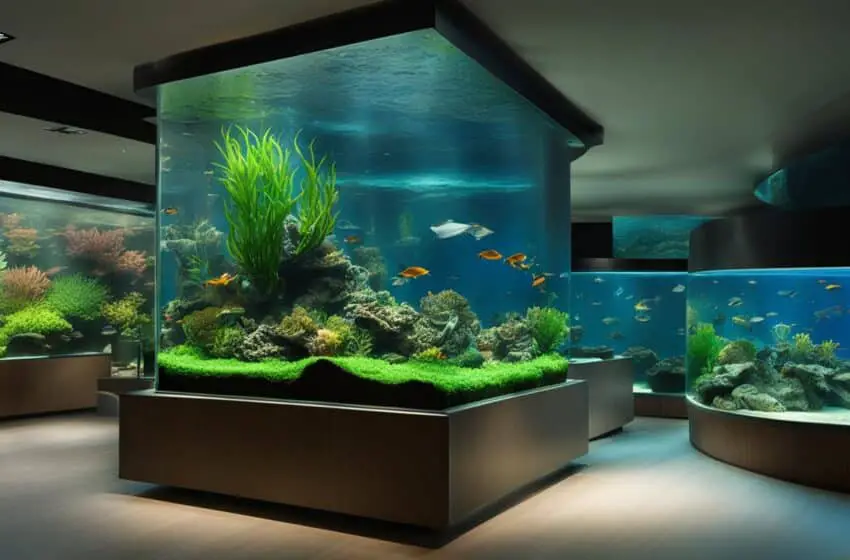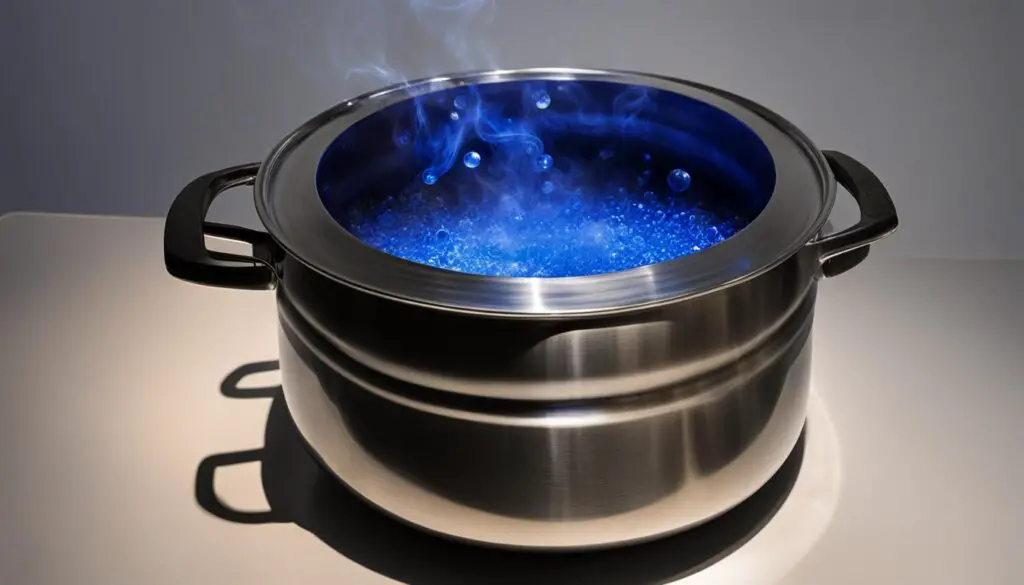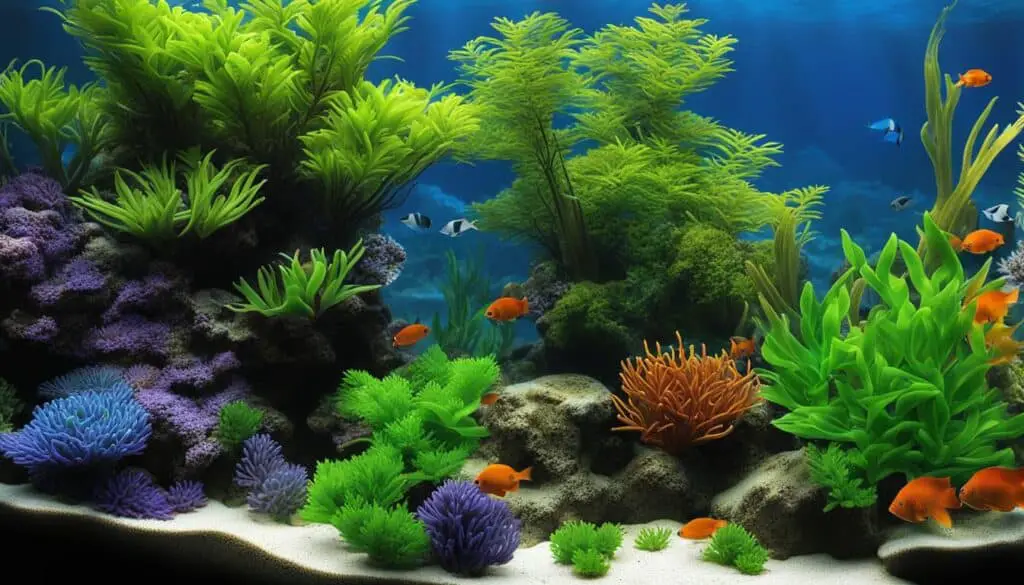Energy-efficient Marine Aquarium Filtration Systems: Lessons from Nature’s Natural Filtration Techniques

Welcome to my article on energy-efficient marine aquarium filtration systems. In this piece, we will explore the fascinating world of natural filtration techniques and how they can revolutionize the way we maintain marine aquariums. By taking inspiration from nature itself, we can create efficient systems that not only provide a pristine aquatic environment but also reduce energy consumption.
Marine aquarium enthusiasts understand the importance of water filtration systems in ensuring the health and well-being of their aquatic inhabitants. However, traditional methods often rely on energy-consuming mechanisms that can be expensive and environmentally taxing.
By incorporating natural filtration techniques into marine aquariums, we can achieve the same high-quality water purification without the excessive energy consumption. These techniques, inspired from nature’s very own filtration processes, can help us maintain a sustainable and thriving marine ecosystem.
Through this article, we will delve into various natural filtration methods that can be applied to marine aquariums. From sand and rock filters that remove physical threats to boiling and chemical purification methods that kill harmful organisms, we will explore the wide range of techniques available.
In addition, we will also discuss how plants can play a crucial role in natural filtration. Certain plant species have the remarkable ability to absorb and convert toxins, enriching the water quality for marine life. The use of fruit peels and seeds can also contribute to the natural purification process, making it an environmentally-friendly choice.
By utilizing these techniques, marine aquarium enthusiasts can effectively create energy-efficient systems that not only promote water quality but also reduce their ecological footprint. Let’s embark on this enlightening journey to discover the wonders of nature’s filtration techniques and how they can benefit our marine aquariums.
Key Takeaways:
- Energy-efficient marine aquarium filtration systems can be achieved by mimicking nature’s natural filtration techniques.
- Incorporating natural filtration methods reduces energy consumption and promotes a pristine aquatic environment.
- Sand and rock filters remove physical threats, providing a foundation for further purification methods.
- Boiling and chemical purification methods effectively kill harmful organisms in marine aquariums.
- Certain plant species and the use of fruit peels and seeds can naturally filter and purify water in marine aquariums.
Water Filtration Systems for Marine Aquariums
Water filtration systems play a crucial role in maintaining the health and well-being of marine aquariums. However, traditional filtration methods often rely on energy-consuming mechanisms, leading to increased energy consumption and costs. To address this issue, incorporating natural filtration techniques can provide a sustainable solution for water purification in marine aquariums.
One effective natural filtration method for marine aquariums is the use of sand and rock filters. These filters, also known as mechanical filters, remove physical threats and hazards from the water, such as debris, uneaten food, and fish waste. By eliminating these impurities, sand and rock filters serve as a foundation for further purification processes.
In addition to mechanical filtration, biological filtration is another essential component of water purification systems in marine aquariums. This process involves the use of beneficial bacteria to convert harmful substances, such as ammonia and nitrites, into less toxic compounds. The bacteria colonize porous materials, such as filter media, bio-balls, and ceramic rings, creating an ideal environment for biological filtration to take place.
“By incorporating natural filtration techniques, marine aquarium enthusiasts can successfully maintain water quality while reducing energy consumption,” says Brian Taylor, a marine biologist and owner of Aquatic Life Solutions.
To further enhance water filtration in marine aquariums, chemical filtration can be employed. This method utilizes activated carbon or chemical resins to remove dissolved impurities and toxins from the water. These substances effectively bind with pollutants, ensuring a cleaner and safer aquatic environment for marine life.
Benefits of Water Filtration Systems in Marine Aquariums
Implementing efficient water filtration systems in marine aquariums offers several benefits, including:
- Improved water clarity: Filtration systems effectively remove debris and impurities, resulting in crystal-clear water that enhances the overall aesthetic appeal of the aquarium.
- Maintained water parameters: Consistent filtration helps maintain optimal water parameters, such as pH, temperature, and salinity, which are crucial for the health and well-being of marine species.
- Reduced stress on marine life: A well-functioning filtration system reduces the presence of harmful substances in the water, minimizing stress on marine organisms and promoting their overall longevity.
In conclusion, incorporating natural filtration techniques, such as sand and rock filters, along with biological and chemical filtration, is crucial for maintaining a healthy and sustainable marine aquarium. These systems not only ensure water quality but also reduce energy consumption, making them an ideal choice for marine aquarium enthusiasts.
Boiling and Chemical Purification in Marine Aquariums
When it comes to maintaining a safe and healthy marine aquarium, proper water purification is crucial. Boiling water is a simple yet effective method of purification that can be applied to marine aquariums as well. Boiling water eliminates bacteria and microorganisms, ensuring water safety for the delicate marine life.

In addition to boiling, chemical purification methods can also be employed to remove harmful organisms from marine aquariums. Tablets or drops containing iodine or chlorine are commonly used for chemical purification. These products offer a quick and convenient solution for maintaining optimal water quality in marine aquariums.
Proper water purification techniques, such as boiling and chemical purification, are essential for creating a safe and thriving marine aquarium environment.
It is important to note that when using chemical purification methods, it is necessary to follow the instructions provided by the specific product, as improper use can harm the marine life in the aquarium. It is also recommended to test the water regularly to ensure that the purification methods are effectively maintaining water quality.
Natural Filtration through Plants in Marine Aquariums
Plants play a vital role in maintaining water quality in marine aquariums through natural filtration. Certain plant species, such as cilantro, reeds, and bulrushes, have the ability to absorb and convert toxins, effectively enhancing the aquatic environment for marine life. Incorporating these plants into the aquarium setup not only improves water quality but also provides a natural and environmentally-friendly filtration solution.
By harnessing the natural filtration capabilities of plants, marine aquarium enthusiasts can create a healthier and more sustainable ecosystem. These plants act as living filters, removing dangerous contaminants and pollutants that may harm marine organisms. Furthermore, they help in oxygenating the water, promoting the overall well-being of the aquatic inhabitants.
Here are some key benefits of incorporating plants for natural filtration in marine aquariums:
- Plants absorb harmful chemicals and heavy metals present in the water, reducing their concentrations and promoting cleaner, safer conditions.
- Root systems of plants provide habitats for beneficial bacteria, which contribute to the breakdown of organic waste and the maintenance of water quality.
- Plants help regulate pH levels in the aquarium by absorbing excess carbon dioxide and releasing oxygen.
- They provide shelter and hiding places for small fish and invertebrates, creating a more natural environment.
Plant Selection for Natural Filtration in Marine Aquariums
When choosing plants for natural filtration, it is essential to select species that are well-suited to the marine aquarium environment. Some popular choices include:
| Plant | Scientific Name |
|---|---|
| Cilantro | Coriandrum sativum |
| Reeds | Phragmites australis |
| Bulrushes | Typha |
These plant species are known for their water purifying properties and their ability to thrive in marine aquarium conditions. Additionally, incorporating fruit peels and seeds can further aid in water purification, as they release beneficial enzymes and substances that support the natural filtration process.

The image above showcases the lush greenery of marine aquariums with natural filtration plants, enhancing both the aesthetics and functionality of the aquatic environment.
By utilizing plant-based natural filtration, marine aquarium enthusiasts can create a balanced and sustainable ecosystem, reducing the reliance on energy-consuming filtration systems. Incorporating plants not only improves water quality but also promotes the overall well-being and vitality of marine life within the aquarium.
Conclusion
By embracing nature’s filtration techniques, marine aquarium enthusiasts can create energy-efficient filtration systems that promote water quality and sustainability. Incorporating natural methods such as sand and rock filters, boiling, chemical purification, and plant-based filtration allows for the maintenance of a pristine aquatic environment while minimizing energy consumption.
Sand and rock filters effectively remove physical threats and hazards from the water, acting as a foundation for further purification methods. Boiling and chemical purification offer quick and convenient solutions to eliminate harmful bacteria and microorganisms, ensuring water safety for marine life. Additionally, the use of plants like cilantro, reeds, and bulrushes aids in toxin absorption and conversion, enhancing water quality for a thriving habitat.
Not only do these natural filtration techniques ensure a healthy environment for marine organisms, but they also reduce energy consumption, making them an ideal choice for energy-efficient marine aquariums. By harnessing the power of nature, enthusiasts can cultivate a sustainable ecosystem that benefits both the aquatic life and the environment as a whole.
FAQ
Why are water filtration systems important for marine aquariums?
Water filtration systems play a crucial role in maintaining a healthy marine aquarium by removing physical threats and hazards from the water, providing a foundation for further purification methods.
What are some natural filtration techniques that can be used in marine aquariums?
Some natural filtration techniques that can be used in marine aquariums include sand and rock filters, boiling, chemical purification, and plant-based filtration.
How does boiling water help in purifying marine aquariums?
Boiling water effectively kills bacteria and microorganisms, making it a useful method for purifying water in marine aquariums and ensuring water safety.
What are some chemical purification methods that can be used in marine aquariums?
Chemical purification methods such as tablets or drops containing iodine or chlorine can be utilized to remove harmful organisms and maintain water quality in marine aquariums.
How can plants assist in natural filtration in marine aquariums?
Certain plants like cilantro, reeds, and bulrushes have the ability to naturally filter and purify water, absorbing and converting toxins to enhance the water quality for marine life in the aquarium.



